24 May 2025
Let’s Talk: ‘Everyone has the right to be heard’
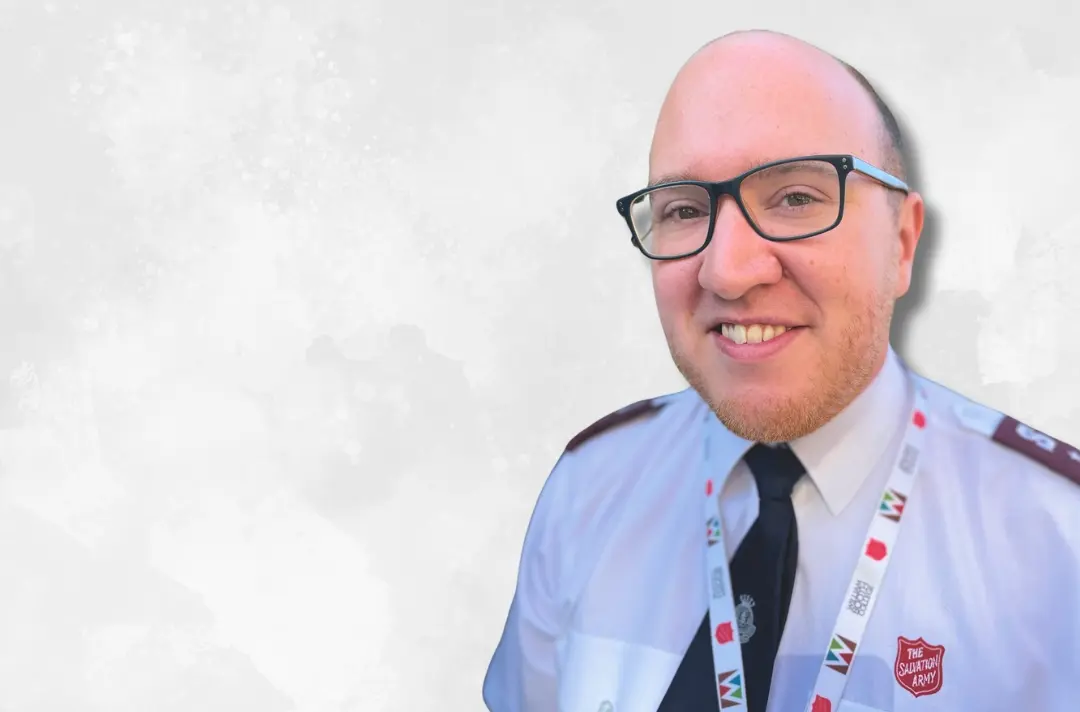
Moral and Social Issues Council member Captain Callum McKenna (William Booth College) talks about the rollout of Let’s Talk… About Sexuality and Relationships.
Over the coming 18 months, divisions across the territory will be holding conversations using Let’s Talk… About Sexuality and Relationships. The materials cover a range of topics and each division will be organising these conversations in different ways. What unites them, though, is their commitment to creating a safe space for everyone to participate, listen and be heard.
What are the Let’s Talk… materials?
The Let’s Talk… About Sexuality and Relationships materials were launched in 2018, shortly after General Brian Peddle (Retired) started to consult the international Salvation Army around human sexuality and appointed Colonel Julie Forrest (IHQ) as the international liaison officer for dialogue on human sexuality.
The Let’s Talk… materials are about encouraging Salvationists to understand each other better, remembering that everyone has the right to be heard and listened to.
Why are we returning to this now?
Let’s Talk… was launched in 2019 in the UKI Territory, but only a limited number of conversations took place. More recently, the Membership Working Group and the Belonging and Believing conference in 2024 showed that sexuality and relationships are an important issue for Salvationists in this territory, and that there was more listening and understanding to be done. How do we appreciate the diversity of views that exist? How do we understand each other better? Conversations are powerful things to help with both of these.
What topics do the materials cover?
Let’s Talk… covers bride price, divorce and remarriage, dowry, married life, partner abuse, pornography, same-sex relationships, sex outside of marriage and singleness. A survey of international leaders led to materials that reflect different cultural contexts around the world.
What we’re finding already is that people in the UKI Territory are keen to talk about several different issues, for example domestic abuse or pornography. These things are prevalent in society and people want safe spaces to talk, listen and explore together.
How and when are these conversations being held?
It will look different from division to division, depending on what best suits their area. Some might gather a large group for a day and have several conversations taking place at once, for example. Others might run a series over a period of time, or take them on the road to different places.
What does a conversation look like?
Each recommended group size is 12 people. There’s time at the start to set ground rules and clear boundaries to protect all participants. This might include worship or fellowship.
The structure uses Faith-Based Facilitation to help everyone reflect theologically. The group identifies the issue, then reflects on it biblically and from personal experience. There’s time to pray, listening for what we call the kairos moment – things the Spirit might speak into and share. A facilitator will make sure everybody has been listened to. A scribe takes notes to chart the conversation, so the group can keep on track. These notes are shredded at the end. The conversation finishes with prayer and then a question: how then shall we live?
How many facilitators are there in the territory?
There are 42 facilitators so far, with more training planned for July. A cross-section of people were invited to be trained as facilitators, following a partnership between senior leadership, the Moral and Social Issues Council, the Mission Service and the Learning and Development team at William Booth College.
Each division nominated at least two people for the training. All the divisional youth officers and specialists were invited, recognising that the Children and Youth Department has done work on the Pastorally Supporting LGBTQ+ Young People resource. All Moral and Social Issues Council members and the Learning and Development team were also invited.
What did the facilitator training involve?
The training lasted four days, including devotions led by the territory’s senior leaders and training in Faith-Based Facilitation and global issues for the Army. All the facilitators have experienced Let’s Talk… conversations themselves, taking turns facilitating, participating and observing.
You could feel the atmosphere change during their conversations, which was proof of how powerful they are. All senior leaders and divisional leaders have experienced Let’s Talk… conversations too.
Why do these conversations matter?
Nothing happens in a vacuum. What goes on in the Church is influenced by what goes on in the world – domestic abuse is happening in society, for example, and it is happening in the Church too. However, we often don’t talk about these difficult subjects or try to separate them from our faith. The risk of that is we don’t fully understand those issues and we don’t fully understand each other.
How is the Let’s Talk… format different from a normal conversation?
Let’s Talk… enables us to have conversations in a holy way. The Handbook of Doctrine says to treat all human relationships as a holy covenant. How do we live this out in our conversations with each other? We have a commonality in Christ that is stronger than any difference between us – belonging to the Church comes through faith in Jesus, and all our relationships flow out of that.
When we have different viewpoints, we don’t simply agree to disagree and live our separate lives – we commit to walking together. It’s easy to walk with somebody you agree with. It’s far more radical to love and commit to someone whose opinion you don’t share. The New Testament talks about the relationship that Christians have with each other as a family, as a household – Let’s Talk… reminds us that we are all different, but that doesn’t stop us from being family.
So it’s about listening as much as talking?
It is. These facilitated conversations are about making sure everyone is able to speak and participate, but that talking is preceded by listening and followed by listening. ‘Let’s Listen…’ might be a better title for them!
What happens after the conversations?
At the end of each conversation, people will be invited to take part in an optional survey – not to canvass viewpoints, but to understand the impact the conversations are having on a personal level. The results of that survey will be anonymous, but will be presented to IHQ and leadership.
Do you think everyone will engage with these conversations?
It’s important to acknowledge that there will be nervousness for some people, because these things might affect their lives more than they do other people’s. Some might be nervous because they don’t want to offend others or because these topics are painful to talk about.
Some people might understandably feel that talking about these issues is paying lip-service, but talking is an important and meaningful action as a faith community: it is committing to listen to each other. International policy isn’t changing as a result of these conversations, but they have the power to change relationships at a local level, to impact how people live their lives and relate to each other. You can trust them to do that.
- To find out how to participate in a Let’s Talk… conversation in your division contact your Divisional Headquarters.
Discover more
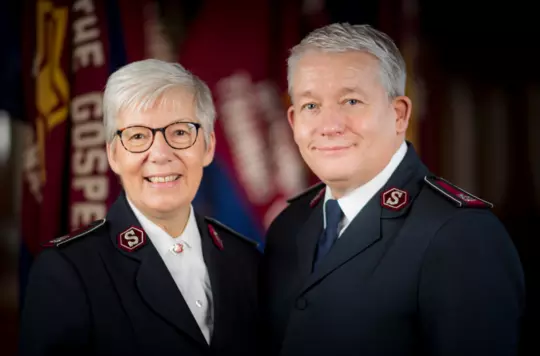
Commissioners Jenine and Paul Main introduce a series of conversations across the UKI Territory about human sexuality and relationships.
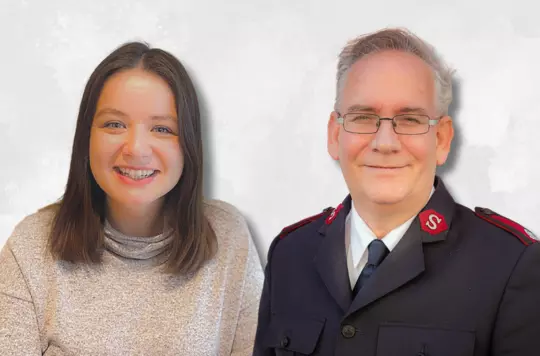
Bethany Gibson (Regent Hall) and Major David Cavanagh (THQ) discuss living with difference as members of the Moral and Social Issues Council.
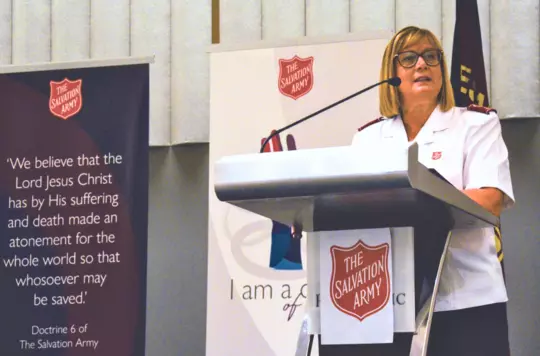
Colonel Julie Forrest talks to Salvationist about her session at Belonging and Believing: The Big Conversation.
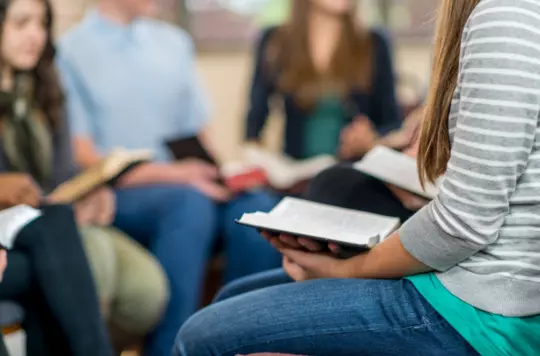
Helping Salvationists engage in moral and social issues in their communities.